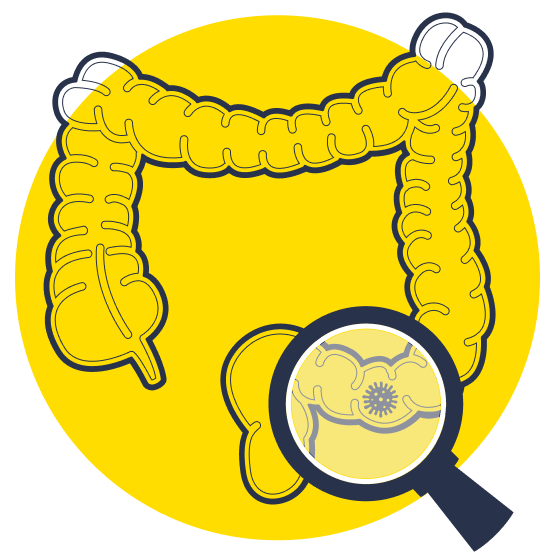A LIFE HACK THAT CAN STOP CANCER
SCREENING DEMYSTIFIED
Look, we get it. Screening for colon cancer may not sound like a walk in the park, but it’s really not that bad — and knowing your status can save your life. The test you have likely heard about, the colonoscopy, looks for small growths called polyps. These can become colon cancer, and about a third of people have a polyp in their gut by the time they turn 45. If polyps are found during a colonoscopy, they can be removed, and colon cancer is prevented. But did you know there are also other noninvasive or at-home tests that look for the signs of cancer and polyps, too? Anything abnormal can be caught early and dealt with!


STEPS TO STOP COLON CANCER
1. CHECK IN WITH YOUR DOC
Before a screening test, hit up your primary care physician or gastroenterologist and chat about your personal and family history of colorectal cancer. No need to be shy – let them know about any odd symptoms you’re experiencing, like blood in your stool, changes in bowel habits, or abdominal pain. Your doctor can recommend a screening test and break down the benefits and risks of each option.
2. CHOOSE HOW TO GET SCREENED
There are a bunch of screening tests for colorectal cancer, including some you can do at home. Your doc will recommend a test that fits your age, family history, and preferences. Here are some options that might be on the table:
And hey, as a first step, you can get a personalized recommendation based on your risk factors. Check out the Colorectal Cancer Alliance’s free screening quiz – they’ve got you covered.
3. PREP LIKE A BOSS
Depending on the test you choose, you may need to make some moves before the big day. If you’re going for a colonoscopy, for example, you might have to stick to a special diet for a few days beforehand and take some laxatives to clear out your system. Check out the Alliance’s prep tips here. At-home tests require little to no prep. Your doc will fill you in on all the deets.
4. GET SCREENED, NO SWEAT
When it’s time for your screening, follow your doc’s orders and either conduct your test at home or show up at the clinic or hospital, depending on which test is right for you. If you are getting a colonoscopy, you might have to get there a little early to sign forms and do pre-procedure stuff. During a colonoscopy, they’ll give you anesthesia or sedation to keep you comfortable. Depending on the test, it could take anywhere from 30 minutes to a few hours, but you’ve got this.
5. FOLLOW UP LIKE A PRO
After the screening test, follow up with your doc to talk results. If everything looks good, you might be good to go for a while before you need to get checked again. But if the test shows something abnormal, your doc might recommend some more diagnostic tests. Positive at-home tests will require a follow-up colonoscopy.

STEPS TO STOP COLON CANCER
1. CHECK IN WITH YOUR DOC
Before a screening test, hit up your primary care physician or gastroenterologist and chat about your personal and family history of colorectal cancer. No need to be shy – let them know about any odd symptoms you’re experiencing, like blood in your stool, changes in bowel habits, or abdominal pain. Your doctor can recommend a screening test and break down the benefits and risks of each option.
2. CHOOSE HOW TO GET SCREENED
There are a bunch of screening tests for colorectal cancer, including some you can do at home. Your doc will recommend a test that fits your age, family history, and preferences. Here are some options that might be on the table:
And hey, as a first step, you can get a personalized recommendation based on your risk factors. Check out the Colorectal Cancer Alliance’s free screening quiz – they’ve got you covered.
3. PREP LIKE A BOSS
Depending on the test you choose, you may need to make some moves before the big day. If you’re going for a colonoscopy, for example, you might have to stick to a special diet for a few days beforehand and take some laxatives to clear out your system. Check out the Alliance’s prep tips here. At-home tests require little to no prep. Your doc will fill you in on all the deets.
4. GET SCREENED, NO SWEAT
When it’s time for your screening, follow your doc’s orders and either conduct your test at home or show up at the clinic or hospital, depending on which test is right for you. If you are getting a colonoscopy, you might have to get there a little early to sign forms and do pre-procedure stuff. During a colonoscopy, they’ll give you anesthesia or sedation to keep you comfortable. Depending on the test, it could take anywhere from 30 minutes to a few hours, but you’ve got this.
5. FOLLOW UP LIKE A PRO
After the screening test, follow up with your doc to talk results. If everything looks good, you might be good to go for a while before you need to get checked again. But if the test shows something abnormal, your doc might recommend some more diagnostic tests. Positive at-home tests will require a follow-up colonoscopy.
Join us and be a leader
who proudly checks their A**
Join LEAD FROM BEHIND and help prevent colon cancer in yourself and others.



